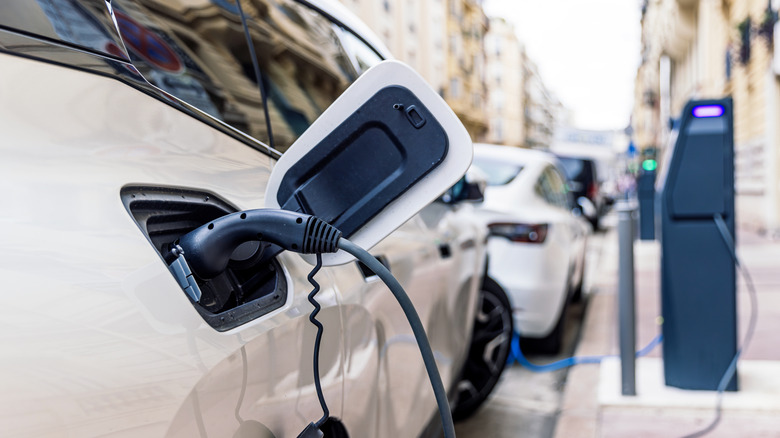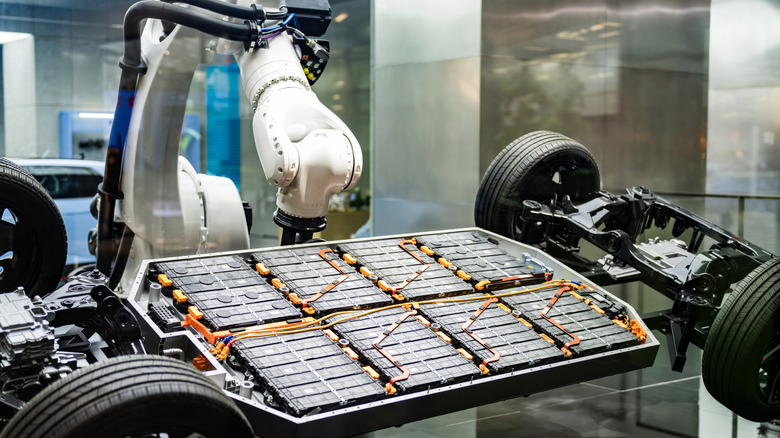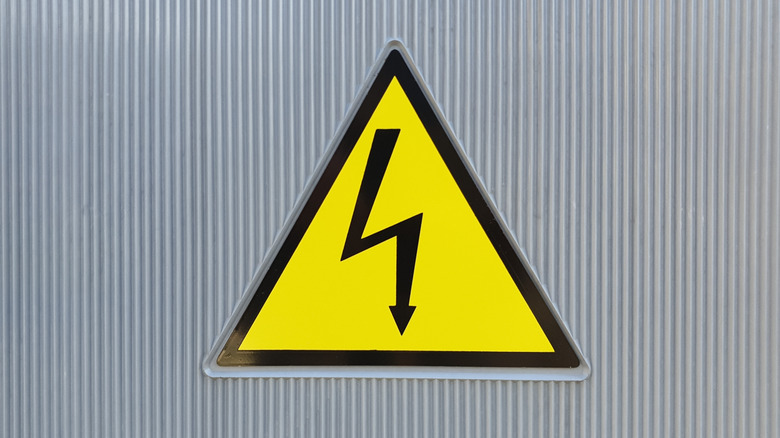Can You Replace EV Batteries Yourself? 3 Reasons You Shouldn't Try It
In theory, EVs should be a no-brainer thanks to their many environmental and operational benefits. But in practice, there are many reasons why you may not want to buy an electric car just yet. Simply put, with these being so relatively new to the marketplace, the same widespread infrastructure that's been in place for decades with gas-operated vehicles is severely lacking for EVs. The result isn't just that EVs are harder to find services for, but they're also typically more expensive to tend to when it does come time to care for them.
Among the services that your electric vehicle will need to have done eventually is getting its battery replaced or repaired. While the average EV battery far exceeds the lifespan of a traditional car battery, with no current model lasting for less than eight years, the difficulty of finding a proper mechanic and the extreme costs attached to making the change may prompt you to want to do the replacement yourself. But if you think that replacing an EV battery is as simple as popping open the hood, getting the right tools, and reading a manual, you're sorely mistaken.
Given the unique construction and functionality of EVs, battery replacements or repairs of any kind is a complex task that very few have the skillset to do. The price tag attached to an EV battery replacement may be hefty, but the consequences of improperly handling this sensitive machinery will always be far more costly.
Handling the battery requires special equipment
Among the elements that sets EV batteries apart from their gas-powering counterparts is their construction. Whereas traditional car batteries are typically made of lead-acid, those of EVs are most commonly constructed using lithium-ion. While they have their advantages and disadvantages, the overall economy and energy density of lithium ion is ideal for powering most batteries. However, these same qualities are what also make EV batteries impractical to work on for most people.
The lithium-ion batteries used to commonly power smartphone and power tool batteries possess one or more cells containing components that are crucial to producing an electric charge. EV batteries can possess thousands of cells, not only because of what they have to operate but also due to their extreme size. While traditional car batteries are essentially compact boxes that fit easily under the hood, EV batteries are elongated rectangular structures that lay under the vehicle's entire floor pan and can weigh up to 1,000 pounds.
If being densely constructed and nearly as long and heavy as the car itself wasn't enough, additional components such as numerous sensors, hydraulic connections, and fireproof elements also need to be in consideration when working on the battery in any capacity. Improper handling can lead to more expensive damage, with some batteries even shutting down entirely if they sense unauthorized handling. As a result, only experts with specialized equipment should be allowed to repair or replace your EV battery.
Improper repairs can be harmful to the environment
One of the biggest attractors to EV usage is wanting to lessen your carbon footprint. However, the truth surrounding their environmental impact is a bit complicated. In use, they don't emit harmful tailpipe pollutants that gas-powered vehicles do. However, EVs can also be surprisingly wasteful, especially when it comes to their batteries. Along with their production often involving the mining of lithium, the battery's components can be harmful if improperly exposed to the environment.
The acidic internal components of an EV battery can leak and potentially mix in with natural elements such as water and soil. This is a typical issue associated with improperly disposing of EV batteries in landfills as opposed to recycling them. However, it can also be a prevalent problem while trying to do repairs on the battery. Those who lack sufficient knowledge of how to handle EV batteries risk damaging it and having its components spill out and contaminate the natural elements.
The potential consequences are so severe that there are even legal consequences to such misuse. In states such as Texas, getting rid of any car battery requires involvement from an authorized recycling facility or battery wholesaler and disposing it in any other manner is considered illegal.
Doing so poses serious safety risks
Anything with the word "electric" in its name is something you shouldn't underestimate, and EV batteries are no exception. While the damage to the battery itself from mishandling is always a potential problem, it doesn't compare to what can happen to you.
In case you were curious, around 50 volts of electricity is considered a lethal amount to most people. The typical EV car battery can contain 400 volts on the low end and reach as high as 800 volts in some cases. So as you can imagine, it doesn't take much for an EV battery to pose a very real life-threatening risk. Along with electrocution being a serious concern, these batteries are also prone to catching fire or even exploding in some rare instances if exposed to hazardous elements or not handled properly.
Given the complex components that make up a typical EV battery, it's near impossible for the average person to get a grasp of how to go about replacing one safely. This is yet another reason why it's best to get a professional to do the job. They possess both the proper protective gear for such work and the knowledge to navigate an EV battery's unique system.



